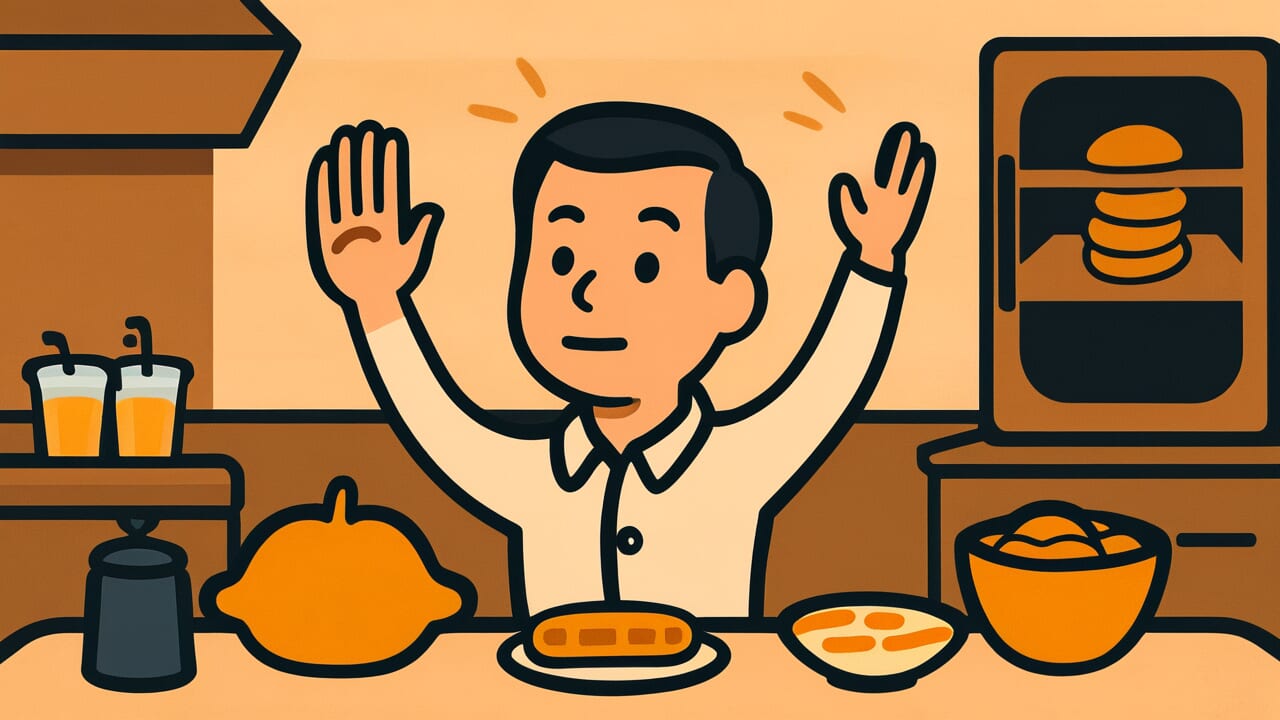How to Read “Growing thin from trying to eat”
Kuō tote yaseru
Meaning of “Growing thin from trying to eat”
“Growing thin from trying to eat” is a proverb that describes an ironic situation. The harder you try to eat, the thinner you become.
It points to a contradiction in life. The more you work toward your original goal, the more you end up with the opposite result.
This proverb is used when someone works hard to make a living. Despite their efforts, they don’t get rewarded. Instead, they become exhausted.
It expresses how desperate efforts spin their wheels. The result ends up completely backwards from what was intended.
Even today, this proverb’s meaning still resonates. People push themselves too hard to achieve their goals. As a result, they damage their health or lose sight of their original purpose.
This situation hasn’t changed from past to present. The proverb contains an important lesson. When your effort’s direction or method is wrong, it can backfire.
Origin and Etymology
The exact source of this proverb is unclear. However, we can make interesting observations from the word structure.
“Kuō tote” means “trying to eat.” It’s an old expression that shows purpose. Then comes “yaseru,” meaning “to grow thin.” This contrast is the heart of the proverb.
Eating is normally an act to gain nutrition and maintain your body. But “kuō tote” carries meaning beyond just eating a meal.
It likely refers to the process of working desperately to make a living. It means running around to earn money. It points to that kind of effort.
Imagine the lives of common people during the Edo period. Many worked from morning to night just to get that day’s meal.
Some ran businesses, others worked as day laborers. They lived desperately in various ways “to eat.” But ironically, the harder they worked, the more exhausted their bodies became.
They grew thinner and thinner. Our ancestors must have keenly observed this contradictory reality.
This proverb shows the sharpness of Japanese linguistic sense. It expresses the ironic relationship between effort and results.
It captures life’s absurdity where purpose and outcome reverse. The expressive power that states this in just seven characters is truly admirable.
Usage Examples
- Getting sick from rushing too much in your job search is truly “growing thin from trying to eat”
- Pushing yourself too hard to succeed in your startup and ending up hospitalized—this is exactly what “growing thin from trying to eat” means
Universal Wisdom
The proverb “growing thin from trying to eat” offers deep insight. It reveals the relationship between human effort and results.
We tend to believe that moving straight toward our goals is a virtue. But this proverb teaches us a different truth.
When humans feel cornered, their vision narrows. The stronger the anxiety becomes—”I must eat,” “I must earn”—the harder it is to make calm judgments.
They cling to inefficient methods. Desperation creates blindness. Even when they should stop and think, they just keep pushing forward.
This is human nature, common to both modern people and ancient ones.
What’s more interesting is this: the proverb doesn’t simply describe failure. It expresses it as “irony.”
Effort should be rewarded, yet effort backfires. This contradiction is the essential difficulty of life.
Our ancestors understood well the difficulty of living earnestly. They knew the danger of making sincere efforts.
This proverb has been passed down for so long because many people have had this experience. Trying desperately to live, only to become exhausted.
These words look at that universal human condition with eyes both warm and stern.
When AI Hears This
Trying desperately to eat in order to gain weight, yet growing thinner instead. This phenomenon remarkably aligns with the second law of thermodynamics.
It shows how “the very effort to maintain order creates greater disorder.”
The human body is a type of heat engine. It takes in energy called food and converts it to body heat and muscle movement.
But according to the second law of thermodynamics, energy conversion always increases “unusable energy.” In other words, the more you panic about eating, the more that psychological stress stimulates your sympathetic nervous system.
Your basal metabolism rises. In fact, chronic stress causes secretion of a hormone called cortisol. This breaks down muscle and converts it to energy.
The contradiction emerges: eating yet growing thin.
Even more interesting is this point. The conscious effort to “eat” disrupts the unconscious system of digestion and absorption.
The body naturally absorbs nutrients most efficiently in a relaxed, parasympathetic-dominant state. But the anxiety of “I must gain weight” destroys this natural order.
The intention to create order invites greater disorder. This is the law of entropy increase appearing in human behavior.
Physical laws teach us coldly about the danger of “trying too hard.”
Lessons for Today
This proverb teaches modern people the importance of judging the quality of effort. Working hard is wonderful, but if you work hard the wrong way, you won’t get the results you want.
You might even make the situation worse.
Modern society overflows with messages saying “try harder.” But what we really need might be the courage to stop and think.
Is the direction of my current effort correct? Is this pace sustainable? Am I sacrificing what’s truly important to achieve my goal?
These questions are what matter most.
When you’re working desperately on something, remember this proverb. Are you just moving blindly out of anxiety and impatience?
Sometimes resting, changing methods, or asking for help are all legitimate parts of effort. True wisdom isn’t about pushing yourself to the limit.
It’s about moving toward your goal in a sustainable way. Stay healthy, keep peace of mind, and advance steadily.
That is the wisdom of living that this proverb teaches.



Comments